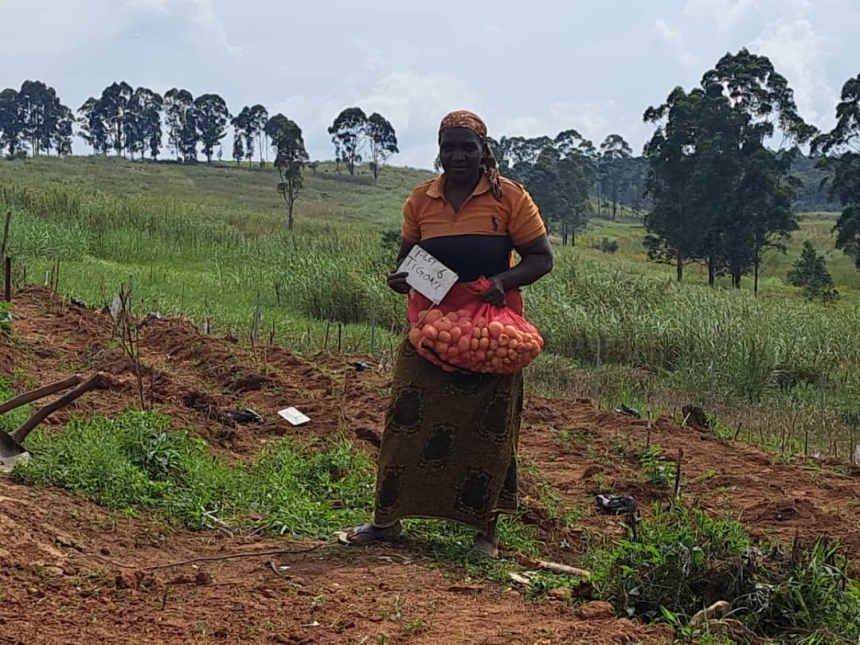Scientists hails outcomes of field trials
Nigerian farmers have been told that the new potato varieties modified to withstand the deadly Late Blight disease responsible for over 90 percent destruction of potatoes across fields in the country would be available for cultivation beginning from the 2025 planting season.
This was revealed by Dr Charles Amadi, a breeder with the National Root Crop Research Institute (NRCRI), Umudike who said Nigeria only needs one more year of regulatory multilocation data to present them to National Biosafety Management Agency for environmental release.
Dr Amadi who is the Principal Investigator, Global Biotechnology Potato Partnership (GBPP) project in Nigeria under the USAID-funded Feed the Future Project that is implemented in 4 countries – Kenya, Bangladesh, Indonesia and Nigeria said, in anticipation of the permit for environmental release this year, Nigeria is set to take the potatoes to On-farm trials in 2025.
“After two years of research work in confinement and multi-location in potato growing belts of Nigeria, because of the uniform results from all locations, we are confident that threats of late blight would be successfully contained in Nigeria with the release of these late blight resistant varieties that will be available in 2025,” Dr Amadi said.
“We just need one more year of regulatory multi-location data to present them to National Biosafety Management Agency for environmental release. If we get the permit for environmental release this year, we will take them to On-farm trials in 2025. If they show consistency of performance across Nigeria we will submit them to the National Varietal Release Committee for consideration and approval after field inspection by the technical sub-committee. Right now all is on course and we are working to meet that deadline,” he added.
Meanwhile, Nigerian scientists have been celebrating the two-year results from both the confined and multi-locational trials of the genetically modified potato varieties currently under research in the country.
Their excitement is sequel to result from data collected and analyzed by scientists at NRCRI after a 2-year research work. They have found that the GM potatoes have a yield advantage of 300 percent over the best performing conventional variety when no fungicide is applied.
Dr Amadi, who is the Director, Tuber Crop Research at NRCRI noted that Nigeria ranks seventh among potato-producing countries in Africa and fourth in Sub-Saharan Africa, with an annual production yield of around 843,000 tonnes (830,000 long tons; 929,000 short tons) and an actual planted area of 270,000 hectares (670,000 acres).
According to a 2012 study, an estimated 300,000 households in Nigeria engage in potato production, which translates to an average planted area of 1 hectare (2.5 acres) per household each year. The country’s main potato-planting region is the Plateau State (Barkin Ladi, Jos South, Riyom, Bokkos, and Mangu) which accounts for almost 90% of the national potato yield. Other potato-producing areas include Obudu in Cross River and Mambilla in Taraba State. Additionally some low level of production take place in Kaduna and Kano state during the harmattan months November-January. Potato production takes place in both the wet season (April till September) and the dry season (October till March).
In spite of these advantages, the average yield in Nigeria of 3.1 tonnes per hectare is among the world’s lowest, as potato production in the country predominantly occurs in small farms whose farmers still rely on traditional tools such as machetes and hoes as opposed to tractors.
This adds to the many constraints facing potato production in Nigeria, including disease and pest, unavailability of good-quality potato seeds, poor storage methods, insufficient education on farming methods and pest control, inadequate research and development, and inadequate farming equipment.
According to Dr Amadi succour has finally come to tomato farmers in Nigeria in the GM potato.
The research is currently being conducted in Nigeria’s potato growing belt of Plateau and Taraba states.
“In our evaluation in the confined and multi-locational trial sites at Kuru near Jos, Bokkos (Plateau State) and Kusuku in Mambilla (Taraba State), we discovered that without the application of fungicides, the biotech potatoes were able to withstand late blights attacks and performed better and our farmers are happy,” he said.
According to him, “The biotech potatoes which are GM potatoes offer famers two vital benefits which includes increased yield and less use of fungicides. These translate into higher income for the farmers and better living conditions.”
Nigeria ranks seventh among potato-producing countries in Africa and fourth in Sub-Saharan Africa, with an annual production yield of around 843,000 tonnes (830,000 long tons; 929,000 short tons) and an actual planted area of 270,000 hectares (670,000 acres). In spite of that, the average yield in Nigeria of 3.1 tonnes/ha is among the world’s lowest.
Potato production in Nigeria predominantly occurs in small farms whose farmers still rely on traditional tools such as machetes and hoes as opposed to tractors. An estimated 300,000 households in Nigeria engage in potato production, which translates to an average planted area of 1 hectare (2.5 acres) per household each year. The country’s main potato-planting region is the Plateau State (Barkin Ladi, Jos South, Riyom, Bokkos, and Mangu) which accounts for almost half of the national potato yield.
Other potato-producing areas include Obudu in Cross River and Mambilla in Taraba State. Potato production takes place in both the wet season (April till September) and the dry season (November till March).





